|
|
|
Sort Order |
|
|
|
Items / Page
|
|
|
|
|
|
|
| Srl | Item |
| 1 |
ID:
100267
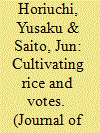

|
|
|
|
|
| Publication |
2010.
|
| Summary/Abstract |
We explore in this article an institutional foundation of agricultural protectionism in Japan, a country long recognized as resisting international pressures to open up its rice market. Using our qualitative analysis of postwar politics of agricultural protectionism and a simple formal model, we argue that farmers in Japan have stronger incentives to mobilize electoral support for the governing party in multimember district systems than in single-member district systems, because the marginal effects of mobilization on policy benefits are different under these electoral systems. Our empirical findings corroborate this claim and provide implications for the gradual changes in Japan's farm policies occurring after the electoral reform in 1994.
|
|
|
|
|
|
|
|
|
|
|
|
|
|
|
|
| 2 |
ID:
180032
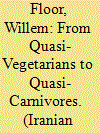

|
|
|
|
|
| Summary/Abstract |
Until the twentieth century there was little change in the diet of Iranians. Bread was the major staple, accompanied by vegetables, fruits, yoghurt, and nuts. Meat and rice were a luxury food for most consumers. In the nineteenth and twentieth centuries new food items were adopted by Persian consumers. After 1970, the modern Iranian diet—large amounts of white rice, meats, sugar-sweetened beverages and sweet/deserts, with few vegetables, herbs, nuts or fruits—has grown increasingly similar to the US diet, with the same health problems.
|
|
|
|
|
|
|
|
|
|
|
|
|
|
|
|
| 3 |
ID:
077782
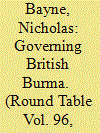

|
|
|
|
|
| Publication |
2007.
|
| Summary/Abstract |
My grandfather, Charles Bayne, spent his career in the Indian Civil Service administering Burma from 1880 to 1906. He and three colleagues - Edward Symes, Donald Smeaton and Herbert Thirkell White - filled the key posts in the central Burmese administration for two decades. He assisted Sir Charles Crosthwaite (Chief Commissioner 1887 - 90) in pacifying the province after the third Burmese war. Through the calmer 1890s he was responsible for economic policies, especially rice cultivation and teak forests. But the quartet broke up in the 1900s: Symes committed suicide; Smeaton fell out with Lord Curzon; Bayne, after two breakdowns, retired early; only White survived, to end his career as Lieutenant Governor. Burma's experience 100 years ago has parallels with the occupation of Iraq and the advance of globalization. The British annexed Upper Burma before deciding its future. The colonial administration was orderly, but inhibited the growth of locally based, democratic government, with consequences still seen today. Burma under British rule grew rich from the export of rice and teak (and later oil), but this wealth went mainly to expatriates, not local Burmese cultivators. The resentment this caused later brought a reversion to inward-looking economic policies
|
|
|
|
|
|
|
|
|
|
|
|
|
|
|
|
| 4 |
ID:
151714
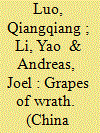

|
|
|
|
|
| Summary/Abstract |
In recent years the Chinese Communist Party has moved to scale up, modernize, and commercialize agriculture by placing it under the direction of large commercial enterprises known as dragonheads. Although scholars have drawn attention to the rapid advance of capitalist-style farming in China, there has been little investigation into how villagers have been pressed to cooperate with this endeavor. In this article, we examine methods used by local officials to create a grape production base for a large wine company in Xinjiang, which entailed getting all the peasant households in several townships—many of which were strongly opposed—to shift from cultivating rice and raising fish to growing grapes on contract. In this aggressive campaign, Party cadres and influential citizens were mobilized to persuade and coerce villagers, using an array of incentives and disincentives, to join what ultimately proved to be a very risky venture.
|
|
|
|
|
|
|
|
|
|
|
|
|
|
|
|
| 5 |
ID:
103778
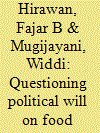

|
|
|
| 6 |
ID:
103855
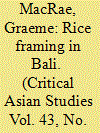

|
|
|
|
|
| Publication |
2011.
|
| Summary/Abstract |
All is not well with agriculture in Southeast Asia. The productivity gains of the Green Revolution have slowed and even reversed and environmental problems and shortages of water and land are evident. At the same time changing world markets are shifting the dynamics of national agricultural economies. But from the point of view of farmers themselves, it is their season-to-season economic survival that is at stake. Bali is in some ways typical of other agricultural areas in the region, but it is also a special case because of its distinctive economic and cultural environment dominated by tourism. In this environment, farmers are doubly marginalized. At the same time the island offers them unique market opportunities for premium and organic produce. This article examines the ways in which these opportunities have been approached and describes their varying degrees of success. It focuses especially on one project that has been successful in reducing production costs by conversion to organic production, but less so in marketing its produce. It argues finally for the need for integrated studies of the entire rice production/marketing complex, especially from the bottom-up point of view of farmers.
|
|
|
|
|
|
|
|
|
|
|
|
|
|
|
|
| 7 |
ID:
084688
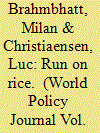

|
|
|
|
|
|
|
|